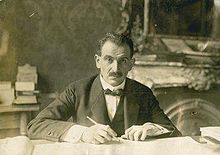Otto Bauer
| Otto Bauer | |
|---|---|

Bauer in office, 1919
|
|
| Foreign Minister of Austria | |
|
In office 21 November 1918 – 26 July 1919* |
|
| Chancellor | Karl Renner |
| Preceded by | Victor Adler |
| Succeeded by | Karl Renner |
| Personal details | |
| Born |
5 September 1881 Vienna, Austria-Hungary |
| Died | 4 July 1938 (aged 56) Paris, France |
| Political party | Social Democratic Workers' Party of Austria (SDAP) |
| Alma mater | University of Vienna |
| Religion | Judaism |
|
|
Otto Bauer (5 September 1881 – 4 July 1938) was an Austrian Social Democrat who is considered one of the leading thinkers of the left-socialist Austro-Marxist grouping. He was also an early inspiration for both the New Left movement and Eurocommunism in their attempt to find a "Third way" to democratic socialism.
Bauer was born in Vienna. Having studied at the University of Vienna, he finished his PhD in Law in 1906 and published his first book, Die Sozialdemokratie und die Nationalitätenfrage, in 1907. Although he was politically active during his studies, his gradual rise in the Social Democratic Party of Austria began after he had finished his doctoral studies. He founded Der Kampf, the theoretical journal of the party in 1907 and between 1907 and 1914 he was secretary of the party. As one of Austria's leading "left" socialists, Bauer was able to establish himself as a likely successor to Viktor Adler as party leader.
Bauer served in the Austro-Hungarian Army and was captured on the Eastern Front in the early months of the First World War. He spent three years as a prisoner of war in Russia, returning to Austria in 1917. After Viktor Adler's death in 1918, Bauer became leader of the Austrian Social Democratic Party. From November 1918 to July 1919 the Austrian Social Democrats formed a coalition government with the Christian Social Party and Otto Bauer was appointed Minister of Foreign Affairs.
Despite his Marxist socialism, he had pan-Germanic and nationalist ideas (he negotiated with the Weimar government an eventual accession of Austria into Germany by March 1919 during the German Revolution), and was disappointed when the Treaty of Versailles expressly prohibited the union of Austria with Germany.
...
Wikipedia
